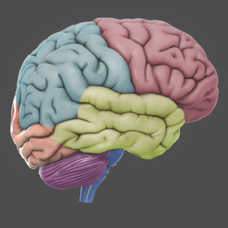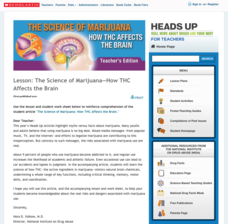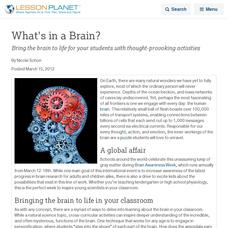Cold Spring Harbor Laboratory
3D Brain
Imagine being able to rotate the brain and view interior structures without dissection! This tool allows anatomy masters to do just that. They also learn about the associated functions, disorders, and symptoms of damage to each...
Baylor College
Pre-Assessment: The Brain
Break your class in to the general structure and function of the brain. Brainiacs discuss what they know about it and create personalized brain development timelines. They also take a true-false, pre-assessment quiz to get them thinking...
University of Minnesota
Beautiful Brain: Brain Inspiration
"Neuroscientists consider Cajal as important to their discipline as Einstein is to physics." The first of four lessons has scholars view Santiago Ramon y Cajal's drawings of neurons. They reflect and respond to the art through writing...
Baylor College
Post-Assessment: Brain Chemistry
If you have implemented this fabulous brain chemistry unit in its entirety, you should have saved the pre-assessment quizzes from day one. In this assignment, individual learners go back over their original answers, and correct any...
Transforming Education
SEL for Educators Toolkit
Four resources make up the SEL toolkit for educators. Intended for those that teach kindergarten to twelfth grade, helpful files include a companion guide, presentation, reference list, and a one-page snapshot that neatly showcases the...
Brain Parade
See.Touch.Learn.
Here is a great app that has tons of potential in helping your child or student with severe to moderate autism, or other intellectual disability, learn words and concepts using research-based methods. Children with autism or PDD NOS have...
Curated OER
Project-Based Learning & Leading Through the 16 Habits of Mind
Blending Costa & Kallick's 16 Habits of Mind, personality type, and project-based learning in your classroom.
Curated OER
Autism And The Brain
Help your class understand Autism. They conduct research into how the brain is effected by the disorder of autism. Then they write a letter to the Center For Disease Control about their findings and forward some of the new research to them.
Baylor College
Food for the Brain
With a couple of neat diagrams on student handouts, your life science or health class will examine the contents and serving sizes of healthy foods. They dissect a slice of pizza and scrutinize the nutritional value of its components in...
Curated OER
Phineas Gage: The Teenage Brain and Connections: Free Choice Activity
During this lesson plan, which is all about making connections, learners watch a documentary about the teenage brain and connect it to Phineas Gage: A Gruesome but True Story About Brain Science, their own lives, and the world.
University of Minnesota
Sheep Brain Dissection
Bored with frog and earthworm dissections? Had your fill of fetal pigs? Anatomy learners will be intrigued by the sheep's brain, and you will be prepared with guiding questions, extension activities, and pictures as they dissect one —...
College Board
AP® Psychology: Special Focus - The Brain, the Nervous System, and Behavior
How does the brain send signals to the rest of the body? Scholars research and analyze the functions of the brain and the central nervous system in the human body. Using hands-on activities, reflections, and research, they begin to...
Scholastic
The Science of Marijuana—How THC Affects the Brain
Marijuana can affect every part of a user's life—starting with the delicate nervous centers of the brain. An informative article and worksheet prompt teenagers to learn more about how the THC found in most forms of marijuana can...
Curated OER
Brain-Controlled Robotic Arms: Cloze activity with Article
Fascinating content about current medical research on brain-controlled prosthetics comes in cloze activity form with a link to the original article. Useful for listening and reading comprehension skills development, and for any science...
Curated OER
Daily Lesson Plan for a Struggling Reader
Strategy-based programs that are executed with consistency are the best for achieving growth in any learner with a learning disability. Here is a seven-step lesson plan that is highly structured and is intended to help learners with...
Baylor College
Crossing the Synaptic Gap
As part of a unit on the chemistry of the brain, thinkers learn how chemicals work to transmit messages between individual neurons and how controlled substances impact the synaptic cleft. They do so by playing a dice-and-card game in...
Baylor College
Neurotransmitters Contain Chemicals
Human body systems students play a card game, "Locks & Keys" in order to learn that neurotransmitters carry a message from one neuron to another by fitting into a receptor site on the receiving nerve cell. While this activity can...
Baylor College
Neural Network Signals
Using a simple circuit with the battery representing the brain, future physiologists test to see which solutions conduct electrical "nerve impulses." Enlighten learners with plentiful information on electric signals in the nervous system...
Curated OER
What's in a Brain?
Bring the brain to life for your students with thought-provoking activities
Curated OER
Train the Body, Train the Brain
An article from the New York Times, 2010, titled "Phys Ed: Can Exercise Make Kids Smarter?" is the springboard for the six short-answer questions posed by The Learning Network. Have your class read the article, answer the questions, and...
Curated OER
Mind Over Matter: How Does the Brain Work
High schoolers research previous attempts by scientists to discover the ways in which the brain works, design and conduct an experiment to illustrate current research and present their findings to the class.
Curated OER
Advance Notice
We often wait until adulthood to start analyzing learning styles. This informative and interesting presentation delves into how we learn. It is a quick and insightful look at how students perform in school. The information could be...
TED-Ed
How Does Your Brain Respond to Pain?
Zap! Ouch! That hurts! But why? And how come people don't experience or respond to pain in the same way? Take a journey on the sensing pathway, from your nociceptors, along your nerves, up your spinal cord, to neurons and glial, through...
Curated OER
Exploring Learned and Innate Behavior
Students explore the differences between learned and innate behavior among humans and monkeys. They complete an assignment and read articles about two studies, which used similar test methods to show that infants and monkeys share an...

























